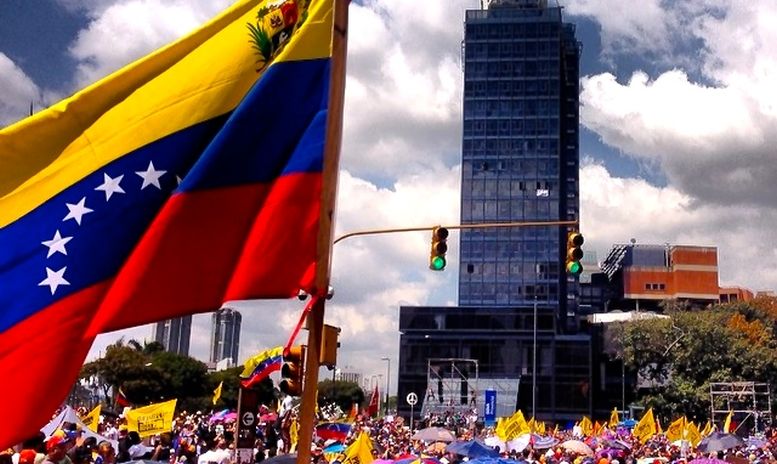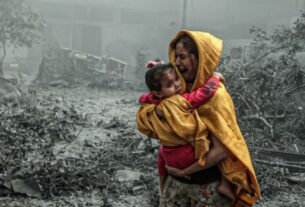For a solution based on working class independence!
The July 28 presidential election in Venezuela was a decisive turning point in the deepening political, economic and social crisis in the country. Beyond the dispute over whether or not to recognize the announced electoral result, the underlying issue is that neither the continuity of Nicolás Maduro and his pro-capitalist policies, nor, even less, the victory of the right-wing, reactionary and coup-plotting opposition, offer any possibility of a way out of the problems affecting the Venezuelan people. The only possible way out is to build an independent working-class alternative armed with a socialist program.
Nicolás Maduro was announced the winner of the Venezuelan elections by the National Electoral Council (CNE) a few hours after the end of voting and the result was ratified on August 22 by the Supreme Court of Justice (TSJ). This result was challenged by the right-wing opposition, which claimed to have won the election with more than two-thirds of the votes, publishing supposed tallies from polling stations on the internet that allegedly prove this. As the Electoral Commission has not released the records under its control and there is no way of comparing them, the opposition’s arguments have gained strength.
The crisis spilled out onto the streets, with demonstrations in Caracas and various parts of the country, including working class neighborhoods that have traditionally been the social base of “chavismo.” There is no doubt that the right wing sought to manipulate these demonstrations of anger, but it cannot be said that these first spontaneous demonstrations were organized and directed by the right. They reflected an unquestionable accumulation of popular dissatisfaction with the Maduro government.
Repression
The government’s response was a repressive escalation which, according to the authorities themselves, led to the arrest of 2,400 people and 25 deaths.
Using the economic sanctions imposed by US imperialism and the coup attempts of the past as justifications, Maduro’s government has been applying harsh austerity policies of spending cuts, privatizations and attacks on social and workers’ rights and democratic freedoms for years.
The greatest demonstration of Maduro’s anti-democratic policy is that any independent manifestation of the struggle of the working class and the left that refuses to simply say ‘amen’ to the government has come under deliberate and planned attack. For example, the independent left, in its different shades, was attacked and prevented from presenting a left opposition candidacy and platform in these presidential elections.
The massive undermining of Maduro’s support, even among the historic social base of ‘chavismo’, and his profound political degeneration is what ends up opening up space for a rebuilding of the nefarious Venezuelan right. Building a left-wing alternative to Maduro is necessary for an effective fight against these reactionaries.
Inter-imperialist dispute on Venezuelan territory
When proclaiming themselves victorious in the election, right wing opposition figures González and Corina Machado were backed by the US government, the European Union and right-wing governments in Latin America. These same countries and authorities staged the farce between 2019 and 2022. in which the former president of the Venezuelan National Assembly, Juan Guaidó, proclaimed himself president of the country.
During this period, sanctions and economic reprisals against Venezuela deepened and new coup attempts followed, but without success. The failure of this offensive, the worsening of the Venezuelan refugee crisis (more than 5.4 million) and the new scenario of an energy crisis resulting from the war in Ukraine, led US imperialism to soften its stance.
The result was the temporary lifting of sanctions against Venezuela and negotiations that resulted in the “Barbados agreements.” But that didn’t last long. Although the US continues to allow special licenses for oil, the sanctions returned and hit the Venezuelan people.
On the other side of the dispute, the recognition of Maduro’s victory was backed by governments aligned with China and Russia, such as Iran, Cuba, Nicaragua, Honduras and North Korea. In addition to these countries, Turkey also recognized Maduro’s victory.
As with US and “Western” imperialism in general, China and Russia also want to protect their investments in the country and guarantee privileged access to oil and minerals. Their economic and geopolitical interests have nothing to do with the needs of the working class and the Venezuelan people.
Venezuela’s economic, political and military dependence on China and Russia has deepened with the economic sanctions imposed by the “West” on both Venezuela and Russia. China is Venezuela’s main creditor and its biggest oil buyer, while Russia has provided Maduro with decisive financial and military support.
Faced with the impasse between Maduro and the opposition, the governments of Brazil, Colombia and Mexico joined forces to seek a negotiated solution to the crisis. This even led the US government, which had already recognized González’s victory, to hint at a step backwards, supporting the negotiation attempts of Presidents Lula, Petro and López Obrador (AMLO). This move, however, failed.
Lula’s position faced harsh public criticism from Maduro and the Brazilian and Venezuelan governments, for the first time in a more pronounced way, were on a collision course. Gabriel Boric of Chile, generally identified as part of the “progressive” camp in Latin America, went even further and aligned himself completely with the right-wing opposition against Maduro.
The international alignments in relation to the Venezuelan crisis reflect to some extent the conflicting geopolitical camps in the global arena with the inter-imperialist dispute between the US and China and allies on both sides. The existence of an intermediary camp, which oscillates between the blocs and seeks advantages on both sides by placing itself in the role of mediators, does not negate the “bipolarization” of global geopolitics, nor does it serve to usher in a supposed “multipolar” international order, as some have suggested.
For an independent socialist alternative
The example of the Venezuelan crisis is used by the right as a straw man against those who insist on defending a left-wing solution in Latin America and internationally. The lack of coherent responses from the left to the Venezuelan crisis leads to all kinds of confusion.
On the one hand, there are those who try to differentiate themselves from Maduro by making abstract democratic appeals, within the limits of formal bourgeois democracy. In general, they do this so as not to give themselves problems among a part of “public opinion” that is hostage to the dominant Western imperialist narrative. Whether it’s Boric in Chile, Brazilian Leftist Guilherme Boulos or government minister Celso Amorim, by remaining within the logic of capitalist “democracy,” they sideline the fight against the right and don’t offer an effective way out.
On the other hand, we have those who pragmatically adopt the logic that “the enemy of my enemy is my friend” and earnestly back the Maduro camp, doing all sorts of contortions to justify the actions of this repressive, corrupt and pro-capitalist government.
For the socialist left, there can be no effective response to the Venezuelan crisis without building an independent alternative for the working class. An alternative that draws on the accumulated experience of struggles and victories, but also the lessons of the mistakes and defeats of recent decades, and rebuilds a consistent socialist movement in the country.
The Venezuelan crisis is not the failure of “socialism,” but a consequence of the absence of a consistent socialist project on the part of the leadership of the “chavista” movement since the time of Hugo Chávez. As happened in Nicaragua, this is a complete degeneration of what was once a revolutionary process that could have been victorious and defeated the capitalists inside and outside the country, and indicated a new path for Latin America and the world as a whole.
International Socialist Alternative says:
- For an independent workers’ solution to the Venezuelan crisis!
- Build a left-wing, working class and socialist opposition in the struggle, on the streets and at grassroots level! No confidence in the coup-plotters and pro-imperialist right, no illusions in Maduro’s pro-capitalist and repressive government!
- Defend democratic rights and freedoms — no repression by the government and no right-wing coup! For the right of the Left and the working class to organize politically and in trade unions!




